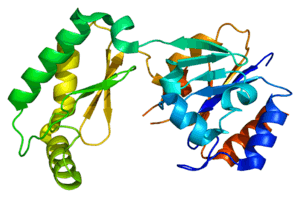PMM2 deficiency
PMM2 deficiency or PMM2-CDG is a very rare genetic disorder caused by mutations in PMM2. It is an autosomal recessive disorder. A defective copy of the PMM2 gene is the most common cause of a disease called “congenital disorders of glycosylation” or “PMM2-CDG”. PMM2-CDG is the most common of a growing family of more than 130 extremely rare inherited metabolic disorders. Only about 1000 children and adults have been reported worldwide.
| PMM2 deficiency | |
|---|---|
| Other names | Carbohydrate-deficient Glycoprotein Syndrome (CDGS) Type Ia, Congenital Disorder of Glycosylation (CDG) Type Ia,Phosphomannomutase Deficiency[1],Jaeken Syndrome, PMM2-CDG , CDG1a |
 | |
| PMM2 protein | |
Signs and symptoms
- Failure to thrive (FTT) - Failure to gain weight and grow at the expected rate.[2]
- Cerebellar hypoplasia - Small cerebellum, which is the part of the brain that coordinates movement.[3][4][5][6][7]
- Liver disease - Elevated liver function tests.[8]
- Pericardial effusion - Fluid around the heart.[9]
- Peripheral neuropathy (PN) - Impaired nerve impulse transmission to the legs. Patients do not respond well to reflex tests.[10]
- Strabismus - Crossed eyes, mainly presented as infantile Esotropia[11]
- Nystagmus - Involuntary eye movements caused by Cerebellar ataxia.[11][12]
- Hypotonia - Weak muscle tone, commonly known as floppy baby syndrome.[13]
Diagnosis
PMM2 deficiency is diagnosed through genetic sequencing. More than 115 mutations in PMM2 gene have been found to cause this disease.[13]
Treatment
There is no cure for PMM2 deficiency. Treatment involves management of the symptoms that are apparent in each individual, including Physical Therapy to improve core strength and mobility, Occupational Therapy for coordination, Speech Therapy for talking and eating.[10]
References
- Matthijs G, Schollen E, Pardon E, Veiga-Da-Cunha M, Jaeken J, Cassiman JJ, Van Schaftingen E (May 1997). "Mutations in PMM2, a phosphomannomutase gene on chromosome 16p13, in carbohydrate-deficient glycoprotein type I syndrome (Jaeken syndrome)". Nature Genetics. 16 (1): 88–92. doi:10.1038/ng0597-88. PMID 9140401.
- Al-Maawali AA, Miller E, Schulze A, Yoon G, Blaser SI (February 2014). "Subcutaneous fat pads on body MRI--an early sign of congenital disorder of glycosylation PMM2-CDG (CDG1a)". Pediatric Radiology. 44 (2): 222–5. doi:10.1007/s00247-013-2782-2. PMID 24037084.
- Izquierdo-Serra M, Martínez-Monseny AF, López L, Carrillo-García J, Edo A, Ortigoza-Escobar JD, et al. (February 2018). "Stroke-Like Episodes and Cerebellar Syndrome in Phosphomannomutase Deficiency (PMM2-CDG): Evidence for Hypoglycosylation-Driven Channelopathy". International Journal of Molecular Sciences. 19 (2): 619. doi:10.3390/ijms19020619. PMC 5855841. PMID 29470411.
- Serrano NL, De Diego V, Cuadras D, Martinez Monseny AF, Velázquez-Fragua R, López L, Felipe A, Gutiérrez-Solana LG, Macaya A, Pérez-Dueñas B, Serrano M (September 2017). "A quantitative assessment of the evolution of cerebellar syndrome in children with phosphomannomutase-deficiency (PMM2-CDG)". Orphanet Journal of Rare Diseases. 12 (1): 155. doi:10.1186/s13023-017-0707-0. PMC 5602850. PMID 28915903.
- de Diego V, Martínez-Monseny AF, Muchart J, Cuadras D, Montero R, Artuch R, Pérez-Cerdá C, Pérez B, Pérez-Dueñas B, Poretti A, Serrano M (September 2017). "Erratum to: Longitudinal volumetric and 2D assessment of cerebellar atrophy in a large cohort of children with phosphomannomutase deficiency (PMM2-CDG)". Journal of Inherited Metabolic Disease. 40 (5): 753–754. doi:10.1007/s10545-017-0056-0. PMID 28600669.
- Serrano M, de Diego V, Muchart J, Cuadras D, Felipe A, Macaya A, et al. (October 2015). "Phosphomannomutase deficiency (PMM2-CDG): ataxia and cerebellar assessment". Orphanet Journal of Rare Diseases. 10: 138. doi:10.1186/s13023-015-0358-y. PMC 4623922. PMID 26502900.
- Barone R, Fiumara A, Jaeken J (July 2014). "Congenital disorders of glycosylation with emphasis on cerebellar involvement". Seminars in Neurology. 34 (3): 357–66. doi:10.1055/s-0034-1387197. PMID 25192513.
- Marques-da-Silva D, Dos Reis Ferreira V, Monticelli M, Janeiro P, Videira PA, Witters P, Jaeken J, Cassiman D (March 2017). "Liver involvement in congenital disorders of glycosylation (CDG). A systematic review of the literature". Journal of Inherited Metabolic Disease. 40 (2): 195–207. doi:10.1007/s10545-016-0012-4. PMID 28108845.
- Footitt EJ, Karimova A, Burch M, Yayeh T, Dupré T, Vuillaumier-Barrot S, Chantret I, Moore SE, Seta N, Grunewald S (December 2009). "Cardiomyopathy in the congenital disorders of glycosylation (CDG): a case of late presentation and literature review". Journal of Inherited Metabolic Disease. 32 Suppl 1: S313-9. doi:10.1007/s10545-009-1262-1. PMID 19757145.
- Sparks SE, Krasnewich DM (1993). "PMM2-CDG (CDG-Ia)". In Adam MP, Ardinger HH, Pagon RA, Wallace SE, Bean LJ, Stephens K, Amemiya A (eds.). GeneReviews®. Seattle (WA): University of Washington, Seattle. PMID 20301289.
- Messenger WB, Yang P, Pennesi ME (April 2014). "Ophthalmic findings in an infant with phosphomannomutase deficiency". Documenta Ophthalmologica. Advances in Ophthalmology. 128 (2): 149–53. doi:10.1007/s10633-014-9427-0. PMC 3990245. PMID 24493206.
- Coorg R, Lotze TE (October 2012). "Child Neurology: a case of PMM2-CDG (CDG 1a) presenting with unusual eye movements". Neurology. 79 (15): e131-3. doi:10.1212/WNL.0b013e31826e2617. PMID 23045520.
- "PMM2 gene". Genetics Home Reference. Retrieved 2018-03-12.